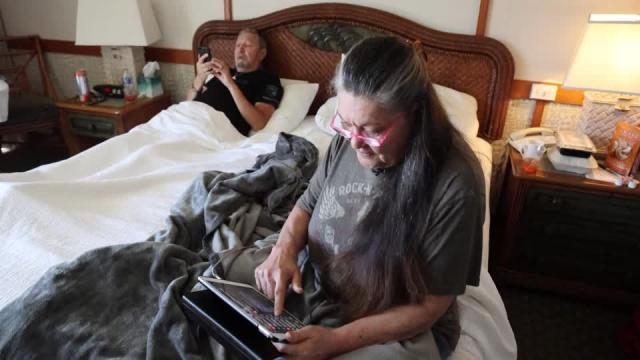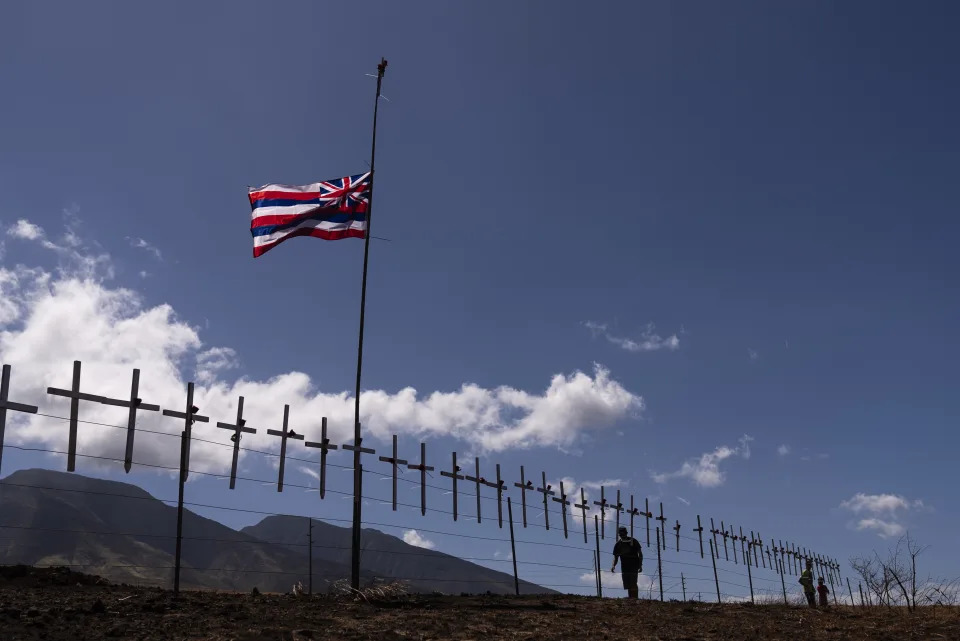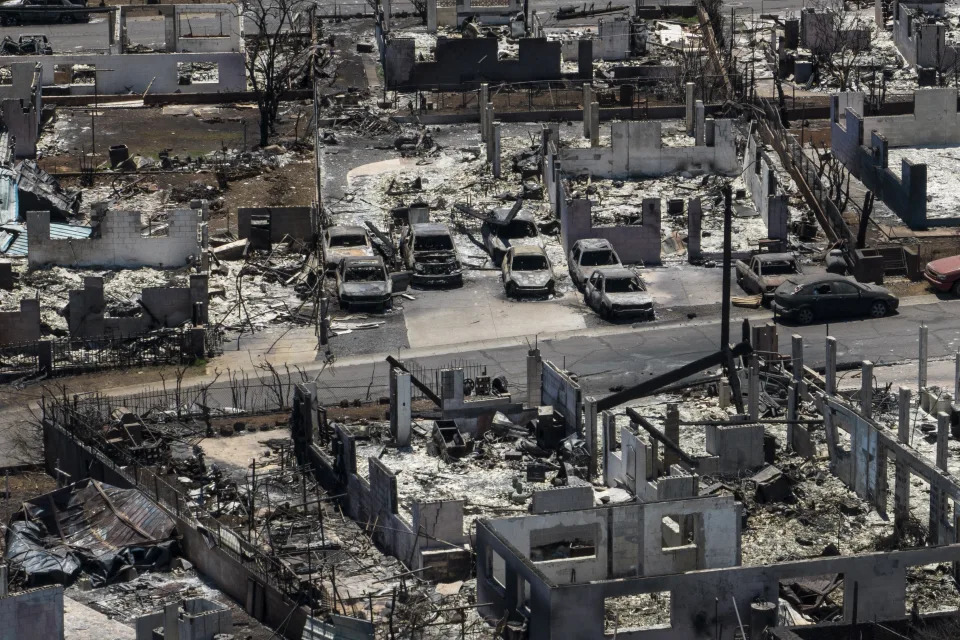Andrew Hay and Liliana Salgado
Updated Tue, August 22, 2023

EVACUEES
KAANAPALI, Hawaii (Reuters) - Deborah Loeffler felt she could not lose much more after a wildfire destroyed the home in Maui, where five generations of her family have lived, and a son died the same day on the U.S. mainland.
Grieving and overwhelmed, Loeffler was soon beset by emails with unsolicited proposals she sell the Lahaina beachfront plot in Maui where her grandfather built their teal-green wooden home in the 1940s.
"It felt like we had vultures preying on us," said Loeffler, 69, a retired flight attendant, sitting in the brown-carpeted hotel room in Maui to which she was evacuated, an untouched container of cooked powdered egg and cold potato by her bedside.
Her experience will be familiar to people in places such as Paradise, California or northern New Mexico, where buyers moved in to try to obtain distressed property after blazes in 2018 and 2022.
Loeffler fears a land grab on Maui would mean the loss of Hawaiian culture.
In Hawaii, the fire exacerbated a chronic shortage of affordable housing, potentially accelerating a drain of multi-generational families from the U.S. state looking for places they can afford to live. The population of Native Hawaiians in the state dropped below the number living on the U.S. mainland over the last decade, according to U.S. Census data.
Before Lahaina was destroyed by the most deadly U.S. wildfire in a century, its average home price was $1.1 million, three times the U.S. national average, according to the real estate site Zillow.
In Maui County, where around 75% the population is Asian, Hispanic, Native Hawaiian or of mixed race, the median household income is $88,000, just 24% above the U.S. average, according to census reports.
Affordable housing advocates such as Hawaii Alliance for Progressive Action (HAPA) are calling for a moratorium on foreclosures.
HAPA along with the state government is documenting unsolicited purchase offers in Lahaina, the early 19th century capital of the kingdom of Hawaii before its overthrow in a U.S.-backed 1893 coup.
Hawaii's Office of Consumer Protection warned of people making below-market offers, playing on fears of foreclosure and the cost of rebuilding. The office declined to comment on how many such offers had been reported.
"We will be making sure we do all we can to prevent that land from falling into the hands of people from the outside," Hawaii Governor Josh Green, who has proposed a ban on Lahaina land sales, said at an Aug. 15 press conference.
Reuters has seen two emails sent by someone claiming to represent The EMortgage in Oklahoma City, one linking to a site called Cash Offer USA. The emails claimed to represent "local buyers" seeking sellers, offering all-cash deals and no closing costs for homes as-is -- "no need to make any repairs." Clicking on the Cash Offer USA link brought up an inactive form for uploading property details.
A functioning website for Cash Offer USA in Florida does offer cash for homes, but has an entirely different format to the Cash Offer USA page sent by The EMortgage.
The EMortgage did not respond to two emails from Reuters seeking comment. Reuters also emailed and called the Florida Cash Offer USA, which did not respond to a request for comment for this story.
Many long-term resident families who lost homes in the Lahaina fire did not have insurance, either because their homes had no mortgage or did not meet building codes, said Sterling Higa, director of Housing Hawaii's Future which seeks to end the state's workforce housing shortage.
How long residents can hold out against property offers may depend on the type of transitional housing they get as they wait to rebuild, said Higa.
"There has to be real support for them in terms of housing, in terms of financial support," said Higa, whose wife grew up in Lahaina.
Disaster response experts expect temporary housing to be provided through a mix of hotel rooms and condos, conversion of rentals, mobile home encampments and possibly some family transfers to Honolulu, the state's largest city.
"Keeping people nearby and engaged in recovery is a good first step to preserving the population," said Andrew Rumbach, a specialist in disasters, climate and communities at the Urban Institute in Washington.
At stake is the survival of Hawaiian culture, said Kaliko Baker, an associate professor at the University of Hawaii.
"If people buy land and build their own Lahaina does that include Hawaiian language schools?" said Baker, in reference to one such school that burned down next to an historic Lahaina church.
Loeffler, now sheltered with her husband a few miles from their destroyed home, deleted the email offers she received in disgust. She is mourning her son, Sam, whose death was unrelated to the Maui fire, and all that her community has lost.
She escaped with her purse and a book by a friend of her late son. She said she owes her life to her tenant who saw the fire coming and went door-to-door telling people to flee.
Loeffler plans to rebuild her plantation-style family home with insurance money so Lahaina can again "look like Lahaina." She wants her grandchildren to keep their connection to an island their Japanese-German-Hawaiian family has lived on for about a century.
"I'm not selling it, if I have to go live there in a tent I'm doing it."
(Reporting By Andrew Hay in Taos, New Mexico, Liliana Salgado in Kaanapali, Hawaii; additional reporting by Rachel Nostrant, Daniel Trotta and Jonathan Allen; Editing by Donna Bryson and Michael Perry)
AUDREY McAVOY, CLAIRE RUSH and JENNIFER SINCO KELLEHER
Updated Tue, August 22, 2023


2 / 14
Crosses honoring the victims killed in a recent wildfire hang on a fence along the Lahaina Bypass as a Hawaiian flag flutters in the wind in Lahaina, Hawaii, Tuesday, Aug. 22, 2023. Two weeks after the deadliest U.S. wildfire in more than a century swept through the Maui community of Lahaina, authorities say anywhere between 500 and 1,000 people remain unaccounted for.
LAHAINA, Hawaii (AP) — Authorities in Hawaii on Tuesday pleaded with relatives of those missing after the deadliest U.S. wildfire in more than a century to come forward and give DNA samples, saying the low number provided so far threatens to hinder efforts to identify any remains discovered in the rubble.
Some 1,000 to 1,100 names remain on a tentative, unconfirmed list of people unaccounted for after wildfires destroyed the historic seaside community of Lahaina on Maui. But the family assistance center so far has collected DNA samples from just 104 families, said Julie French, who is helping lead efforts to identify remains by DNA analysis.
Maui Prosecuting Attorney Andrew Martin, who is running the center, said the number of family members coming in to provide DNA samples is “a lot lower than they’ve seen in other disasters,” though it wasn’t immediately clear why.
“That’s our concern, that’s why I’m here today, that’s why I’m asking for this help,” he said.
Martin sought to reassure people that any samples would be used only to help identify victims of the fires and would not be entered into any law enforcement databases or used for any other purpose. Those who donate also would be not asked about their immigration status or U.S. citizenship, he said.
“What we want to do — all we want to do — is help people locate and identify their unaccounted-for loved ones,” Martin said.
Two weeks after the flames tore through Lahaina, officials are facing huge challenges to determine how many of those perished and how many may have made it to safety but haven't checked in.
Something similar happened after a wildfire in 2018 that killed 85 people and destroyed the town of Paradise, California. Authorities in Butte County, home to Paradise, ultimately published a list of the missing in the local newspaper, a decision that helped identify scores of people who had made it out alive but were listed as missing. Within a month, the list dropped from 1,300 names to only a dozen.
“I probably had, at any given time, 10 to 15 detectives who were assigned to nothing but trying to account for people who were unaccounted for,” Butte County Sheriff Kory Honea said in a phone interview. “At one point the local editor of our newspaper … said, ‘Hey, if you give me the names, I will print them.’ And at that point it was like, ‘Absolutely. Anything that we can do to help out.’ ”
Hawaii officials have expressed concern that by releasing a list of the missing, they would also be identifying some people who have died. In an email Tuesday, the State Joint Information Center called it "a standard held by all law enforcement and first responders here in Hawaii, out of compassion and courtesy for the families, to withhold the names until the families can be contacted.”
As of Monday, there were 115 people confirmed dead, according to Maui police. All single-story, residential properties in the disaster area had been searched, and teams were transitioning to searching multi-story residential and commercial properties, Maui County officials said in an update late Monday.
There are widely varying accounts of the tally of the missing. Hawaii Gov. Josh Green said Sunday that more than 1,000 remained unaccounted for. Maui Mayor Richard Bissen said in a pre-recorded video on Instagram that the number was 850. And during President Joe Biden's tour of the devastation on Monday, White House homeland security adviser Liz Sherwood-Randall put it between 500 and 800.
An unofficial, crowd-sourced spreadsheet of missing people posted online listed nearly 700 names as of Tuesday.
Roseanna Samartano of Lahaina said she didn’t know anyone was looking for her until an FBI agent phoned her a few days ago to say she was on a missing persons list.
“I was shocked. Why is the FBI calling me?” the 77-year-old retiree said. “But then he came out with it right away, and then I kind of calmed down.”
It turned out a friend had reported her missing because he'd been unable to get in touch despite calling, texting and emailing. Her neighborhood of Kahana — which didn’t burn — had no power, cellphone service or internet in the days after the fires.
Sen. Gilbert Keith-Agaran, representing central Maui, said he’s not aware of any rules that prevent officials from making the list public. But as someone with several members of his extended family still unaccounted for, he understands why some may not want the list released.
“I’m not going to second-guess the approach by the mayor and his people right now,” he said.
Questions are also emerging about how quickly the names of the dead are being publicly released, even after family members have been notified. Maui residents are growing increasingly frustrated as the search for their loved ones drags on.
The Honolulu Star-Advertiser reported Tuesday that the Maui Police Department has instructed the medical examiner in Honolulu — where some burn patients were taken for treatment — not to release the names of anyone who dies from injuries sustained in Lahaina fire. The request came after one severely burned patient died and the man's name appeared in media reports after notification of his next of kin.
“I don’t know why they aren’t releasing the names," Honolulu Department of the Medical Examiner Supervising Investigator Theresa Reynolds told the newspaper.
Clifford Abihai said he feels like he's getting the run-around from authorities. He came to Maui from California after getting nowhere finding answers about his grandmother, Louise Abihai, 98, by phone. He has been just as frustrated on the ground in Maui.
"I just want confirmation,” he said last week. “Not knowing what happened, not knowing if she escaped, not knowing if she’s not there. That’s the hard thing.”
As of Tuesday, he said, he still had learned nothing further.
His grandmother lived at Hale Mahaolu Eono, a senior living facility where another member of his extended family, Virginia Dofa, lived. Authorities have identified Dofa as one who perished. Abihai described Dofa and Louise Abihai as best friends.
He said his grandmother was mobile and could walk a mile a day, but it was often hard to reach her because she'd frequently turn off her cell phone to save battery power.
Confirming whether those who are unaccounted for are deceased can be difficult. Fire experts say it’s possible some bodies were cremated in the Lahaina fire, potentially leaving no bones left to identify through DNA tests.
“Those are easy when destruction is modest,” said Vyto Babrauskas, president of fire safety research consulting firm Fire Science and Technology Inc. “If you go to the extreme of things — if turned to ash — you’re not going to be able to identify anything.”
Honea, the Butte County sheriff, said it took weeks to complete the search for remains in Paradise, and his detectives worked 16-hour days to narrow the list of the missing. Today there is only one person who still remains unaccounted for, and Honea said he has reason to believe that person was not in town the day of the fire.
The situation on Maui is evolving, but those who lived through similar tragedies and never learned of their loved ones' fate are also following the news and hurting for the victims and their families.
Nearly 22 years later, almost 1,100 victims of the 9/11 terror attacks, which killed nearly 3,000, have no identified remains.
Joseph Giaccone’s family initially was desperate for any physical trace of the 43-year-old finance executive, who worked in the World Trade Center's North Tower, brother James Giaccone recalled. But over time, he started focusing instead on memories of the flourishing man his brother was.
If his remains were identified and given to the family now, “it would just reinforce the horror that his person endured that day, and it would open wounds that I don’t think I want to open,” Giaccone said Monday as he visited the 9/11 memorial plaza in New York.
“So I am OK with the way it is right now,” he said.
____
Rush reported from Portland, Oregon, and Kelleher reported from Honolulu. Associated Press writers Jennifer Peltz in New York, Janie Har in San Francisco and Becky Bohrer in Juneau, Alaska, contributed.
No comments:
Post a Comment